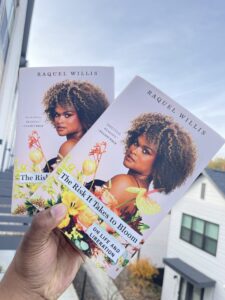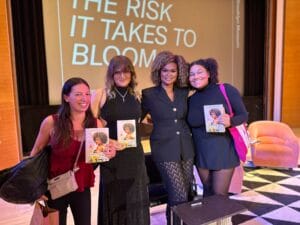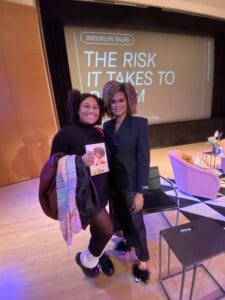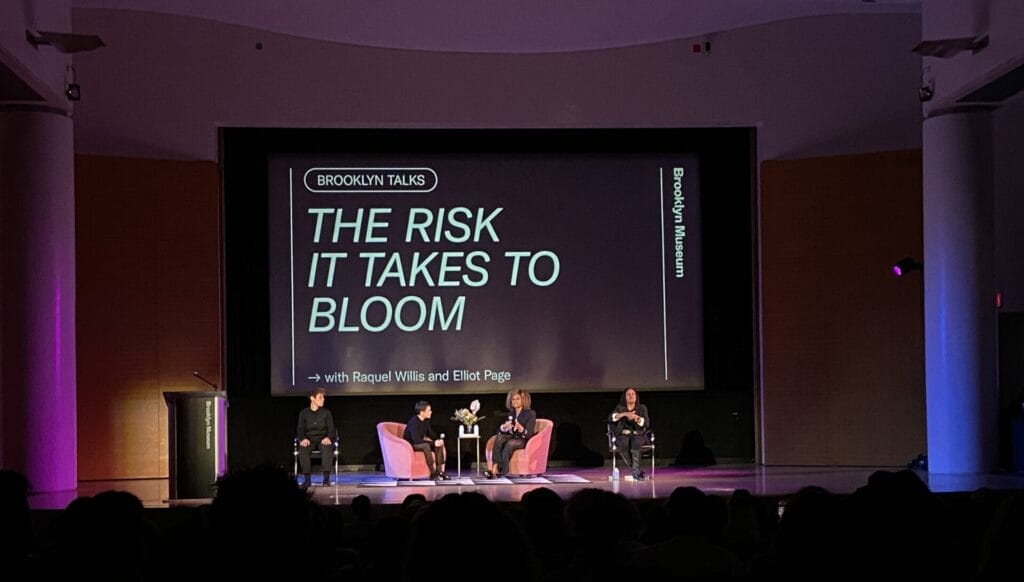Last Tuesday, November 14th, marked the official release of award-winning activist, journalist, and media strategist Raquel Willis’ debut memoir The Risk It Takes to Bloom, as well as the launch of her well-anticipated book tour.
The tour kicked off last week in New York City at Strand Bookstore, where Raquel was joined in conversation by icon Laverne Cox. Two days later, The Risk It Takes to Bloom took center stage at the Brooklyn Museum, which hosted Raquel in conversation with Elliot Page.
Much like the movement of The Risk It Takes to Bloom, the conversation that flowed between Raquel and Elliot was open, earnest, and ramifying in its vulnerability and impact. Every seat was filled, and the audience was rapt as Raquel reflected on the book, her personal and professional experiences, the cause of liberation, and what it means to move through the world as an LGBTQ person of color.

While meditating on different excerpts and sections from the book, Raquel shared an anecdote about an interview she’d done the night before. One of the first questions she asked was an invasive inquiry into the intimate details of her body. She reflected on how, all too often, trans people are systematically reduced to the state of their bodies when, like every human being, they are made up of multitudes and worth that extends far beyond the boundaries of the body: “As a trans woman, I can give you so much more than a little piece of my body.”
Throughout the night, Raquel and Elliot touched on topics ranging from capitalism, grassroots organizing, transmisogynoir, the love and strife we sometimes find in our families of origin, building chosen family and support systems, growing up in the southern United States, activism, and building a better world, among so many other things.
Even amidst a plethora of increasingly important discussion points, one of the most hard-hitting takeaways was Raquel’s rumination on the people that surround her and have touched her life: “There are no heroes or villains in my story. There are only folks who evolved.” It came as an important reminder that there are always ways to grow, progress, and elevate alongside the people in our communities, that there is always a path forward to be built with people who are willing to expand their minds and join in the work.

Early in the conversation, Raquel shared that she “came into [her] womanhood at a time when trans people were supposed to bury [their] history.” She took care to honor and name other Black trans and queer people, alongside other LGBTQ people of color, who came before her, writing their own histories into existence. The Risk It Takes to Bloom will undoubtedly take its place among these seminal and celebrated works, and its brilliance will surely inspire numerous generations to come.

As The Risk It Takes to Bloom’s touchdown in Brooklyn came to a close, one of the last Q&A questions to be answered asked Raquel what advice she had for a young trans person who was coming to terms and struggling with being seen by the world. Her response is an important reminder of the power that exists in community, which was reflected so clearly in the texture and atmosphere of the room: “When we see each other, that does something more transformative than that idea that the world needs to see us.”













